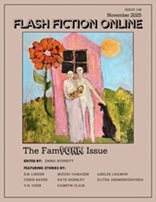 Flash Fiction Online #146, November 2025
Flash Fiction Online #146, November 2025
“Ursula” by E. M. Linden
“The Last Ofuton in Orbit” by Mizuki Yamagen
“A Proper Mother, Unhexed” by Ashlee Lhamon
“Unfinished Conversations Package” by Chris Baker
“The Tao of Thorstein Codbiter” by Kate Horsley
“Loxley Is One Thousand Bats” by Camsyn Clair
“Gifts from On High” by V. H. Chen
“Hope Is the Thing with Circuits and Steel” by Elitsa Dermendzhiyska
Reviewed by Victoria Silverwolf
This special double-sized issue contains stories that the magazine calls FamPunk. This neologism refers to intimate, small-scale tales of science fiction and fantasy dealing with family. The resulting works are often surreal and sentimental, with moods ranging from whimsical comedy to gentle melancholy.
“Ursula” by E. M. Linden takes place in a fantasy version of the modern world in which some very young children can change into animals. This form of metamorphosis can be eliminated through surgery. The narrator discovers that her daughter transforms into a bear cub each night, considers the surgery, and reveals her own experience.
The story can be read as an allegory for allowing people to be themselves. It starts with the narrator seeing the bear cub and thinking at first that her daughter was devoured by the animal. In a fantasy world where shapeshifting children are known to exist, I had to wonder why she would jump to this conclusion. The last sentence makes this assumption even less logical.
Set on a space station, “The Last Ofuton in Orbit” by Mizuki Yamagen features a narrator who inherits a sleeping mattress from her grandmother. The object is inhabited by a spirit that talks to the narrator. She cares for the mattress as it inevitably succumbs to the process of aging.
The mixture of science fiction and fantasy is unusual, but I saw no particular reason why the story needed to be set in space. The premise can be seen as a metaphor for dealing with elderly relatives.
The protagonist of “A Proper Mother, Unhexed” by Ashlee Lhamon is a witch who uses the vegetables she grows to cast spells. Sometimes babies come out of her cabbage patch to be adopted by the women who visit her garden. When one such infant is unclaimed, the witch ponders how to deal with the situation.
This is the kind of fantasy in which anything can happen. The witch talks to animals and even consults the moon. The plot suggests that motherhood is extremely difficult, but worth the necessary sacrifices. No doubt many parents will agree. The story will best appeal to readers who enjoy light, comic fantasy.
“Unfinished Conversations Package” by Chris Baker consists of text messages exchanged between a man and a computer simulation of his father, who is presumably deceased. The story is set in 2029, but the simulated father acts as if it exists in the 1990’s. The son contacts technical support about the problem and wonders whether to reset the simulation.
The speculative technology is plausible, given the current state of artificial intelligence. The son’s reaction to the simulation is ambiguous, and his character is revealed in a subtle fashion. There is much to ponder about the relationship between parent and child in this deceptively simple tale.
In “The Tao of Thorstein Codbiter” by Kate Horsley, the narrator replaces the furnishings in the home of his ill mother with living Vikings. She approves of the change as her disease progresses.
The story changes mood drastically from comic to sentimental. Readers are likely to find this sudden alteration disconcerting. The bizarre premise, with Vikings acting as showers and television sets, clashes with the emotional conclusion in a way that throws one for a loop.
The title of “Loxley Is One Thousand Bats” by Camsyn Clair announces its fantasy premise clearly. The title character turns into one thousand bats during moments of crisis. The narrator deals with this transformation as well as can be expected.
References made to self-cutting and adolescent angst indicate that the premise is a metaphor for painful emotions. There is also a suggestion that bad feelings can be endured by sharing them with another. This point might have been made more clearly if we knew more about the completely anonymous narrator, who might be a relative, a friend, a lover, or something else.
“Gifts from On High” by V. H. Chen consists of text messages exchanged between the mother of a young boy and her father. They live in a fantasy world, and the plot deals with inappropriate supernatural gifts that the man sends to his grandson through a magic portal. The mother eventually turns the tables on him.
This is a very light comedy that is best described as cute. It offers no new insights into family relationships, but it may raise a smile.
In “Hope Is the Thing with Circuits and Steel” by Elitsa Dermendzhiyksa, two grandmothers join a group of robots who are on strike. The women prepare meals for the machines that allow them to experience emotions. Boiled potatoes, for example, are the incarnation of sadness.
As can be seen, this is another story that blends a science fiction background with a fantasy premise. The food and emotions (some of which can only be named using words in languages other than English) are described in a vivid manner, but the blending of genres is not always fully successful.
Victoria Silverwolf is not a parent.